| History - 49th A.I.B. - Company 'B' |
 | Index
|
| Index
| | Next |
| Next |
|
(Pages 09-12)

24 July, 1944
Turmoil reigned supreme at Camp Polk as the cry went round. "POM qualified before August 1st!" Rumors began to spread, the 8th was going on another "Maneuvers". Everybody groaned and wished that they were going overseas instead.
1 August
Rumors became real, as the "Packing and Crating" detail was formed to prepare our equipment for overseas shipment. It looked like we were really on our way. There were still some die-hards left, though. Waigenfeld swore to the end that we were merely moving to another camp. "All right laugh," he said, "but just you wait, I got this straight from a T/5 in Division Headquarters.
25 October
The emphasis was transferred from the group to the individual, for he had to have the best equipment available for the battle towards which we now knew we were heading. The pace became fast and furious. as passes became the No. 1 talked of thing. Married men had to send their wives home. but before they did they sure made up for lost time. If you don't believe it, ask Scott Rich, Dick Michaels, and Gust Demo.
|
Mmm, marriage is a wonderful institution.
31 October
Everybody was excited, for this was the day to board the train for our swing northward. We don't think there is a man among us who will forget that day. The band showed up to give us a send off, and played "Stars and Stripes Forever", the Division theme song "Roll Out the Barrel", and for some unknown reason, "California, Here I Come." The weather was typical of the refreshing Louisiana climate, with the thermometer registering 105, and the Yanks began to fight the Reds again in a verbal Civil War, the former claiming the latter would finally get a look at civilization, and the latter claiming that the former was "In God's country now, son!" Feelings and emotions were mixed, as the train pulled out of Polk.
2 November
We arrived at our destination, Camp. Kilmer. New Jersey, whose chilly fog was quite a change for us, used as we were 10 the torridness of Rose Pine 4. During our three day trip we had crossed Louisiana, Mississippi, Alabama, Georgia, and swung north through
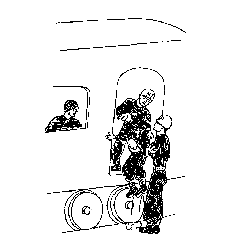
|
-- 9 --
|
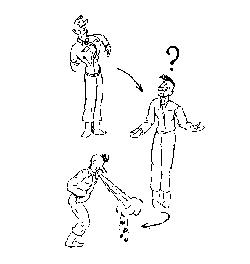
Tennessee, the beautiful hills of Virginia, through Washington D. C. and Maryland, into Pennsylvania. On one stop just outside Philadelphia, Lt. Rankin commented to Capt. Anderson. "Just smell that air!" Andy did, and spent the next half hour coughing up cinders. We rolled out of Pennsylvania, into New Jersey, and the end of our train trip.
3 November
The first two days following our arrival were spent completing preparations for embarkation. Indoctrination and processing were our first objectives, and next came checking clothes, and checking clothes, and checking clothes, until we almost went batty, and had to totter over to the PX to seek solace with malted milks, ice cream, and pretty waitresses.
4 November
M/Sgt. Harry Murray finally broke down and gave 12 hour passes to New York. A stranger blundering into the barracks would get the impression that he was caught in a combination of the Indianapolis speedway and a gambling 'casino at Monte Carlo. The barracks was emptied in a cocked time of 35.4 seconds. and in ten hours a good number of the B Co. doughboys couldn't tell a red light from a green one. It is the general opinion that this temporary attack of "color blindness" was not entirely due to the change of climate.
|
5 November
B Co. went on the alert and moved out for the embarkation, as usual, long before dawn. Willard Robinson said that when he was married and had some children, he would personally line them up at the breakfast table in the morning and yell "Navy, Navy, Navy!" to show his appreciation for the Army.
The ferry ride across the harbor was another thing we won't forget. The big skyscrapers loomed up before us, looking larger and grander than ever before. It was lonesome for the native New Yorkers to watch their home town pass in review and to know it would be a long time before they saw it again.
A "gigantic" ship labeled "H. M. S. Samaria. Liverpool", and painted a drab battleship gray loomed up before us as we staggered up the gangplank to our quarters, loaded down with all our worldly possessions, and clutching the Hershey bar that the Red Cross ladies forced in our dank little paws. It was the biggest ship any of us had ever been on, including Pardridge, who had sailed many a schooner off the Florida Keys in his civilian days. We had all been pronounced fit for overseas duty after our stiff physical at Kilmer. "Stiff" physical, one stiff motion and it was done, and now it looked like our last chance to back out was gone.
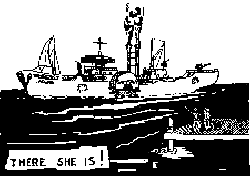
|
-- 10 --
|
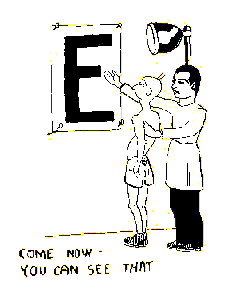
7 November. Sailing Date.
For two days the ship had been filling up with men and equipment. B Co., the first to board the ship had been undergoing the fiendish torture of standing helpless and imprisoned on the deck looking down 47th St. into the heart of New York - so near and yet so far. At 1100 hours the scurrying tugs gave a couple of whistles and the ship moved slowly from the docks.
On the way through the harbor we passed the Statue of liberty, and everyone raced to the portholes for a last look at this proud symbol of America. We stood solemnly whispering hopefully to ourselves, 'Home alive in "45"', and knew that our sentiments were shared by every man on the ship.
Election returns were broadcast throughout the ship that night, and before we crawled into our bunks we were sure of two things; that Roosevelt was still President, and the Eighth was going overseas.
8 - 18 November. On the high seas.
B Co. drew gun crew and MP details aboard ship, and spent their duly hours
|
scanning the skies for Stukas, and the seas for U-boats, or checking their buddies for lifebelts and dousing any tell-tale light showing an the blacked out decks. For some of us, stuck high above the decks in the gun platforms, the trip will long be remembered for its black, rainy nights, and for the way the ship rolled at this height, and the disturbing effect it had on the stomach at times. We experienced a couple of alerts, but whatever It was was scared off before it got to us, and we had to postpone the thrill of shooting dawn a Nazi plane until a later date. Much time was spent on these watches in fascinating conversation with the 'Limey' Marines, who served as gun captains, which was our first taste of a 'foreign' language.
Leisure time was spent in sleeping, reading, griping about the chow, and playing a highly entertaining game known as 'Come Seven', which involved the exchange and redistribution of currency. On rougher days, a contingent might be seen, leaning precariously over the rail, muttering 'Oh God, let me die now', but for the most part we became quite seasoned seafaring men, who knew port from starboard, and why it was best not to spit to wind'ard.
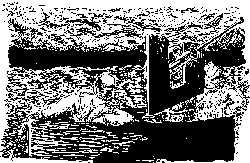
|
-- 11 --
|
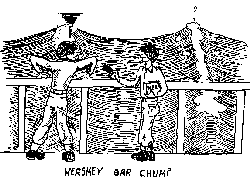
19 November. Landing.
The day before somebody had yelled 'Land, on the port side'., and for two hours the boat had listed to port. Land was a welcome sight after 12 days of roiling seas and pitching decks. Some were a little disappointed. 'Where's dem white cliffs?', asked 'Shorty' Riehle. 'No blueboids, neither!'.
We tied up at Southampton docks about neon, where we were greeted by a band and a General, who said that England was glad to see us and hoped that we would enjoy our stay. We gathered on the decks to throw cigarettes and coins to the 'Limeys' on the docks, and whistled at the women dock workers who wore sweaters. At length we received our orders to disembark, and picking up our duffle bags, weapons, and packs. We filed slowly down the gangplank and on to the docks, where one of those dinky English engines had pulled up a string of cars for us. After a short break, during which we were fed coffee and doughnuts, from a Mobile Red Cross Unit, we crammed ourselves, eight men and about five hundred pounds of equipment, into a compartment, on the train, and started for our new home.
Tidworth! What a name. We arrived there In the dark, and after untangling ourselves on the platform, we boarded a group of trucks waiting to take us to our 'barracks'. They have nice barracks at Tldworth, but the trucks drove gaily by them, and slogged miles into the wilderness, stopping at last amid a cluster of tents, floating on a sea of mud. Our New Home.
|
20 November - 2 January
We gradually sank into a semi-garrison life.. KP, Guard, and a training schedule made their appearance again. A great deal of our time was devoted to "fixing up the tents", and trying to scrape up enough fuel to keep the temperatures in our tents above absolute zero. Once or twice a day a truckload of scrap wood would unload near the CP, and representatives from each tent, chosen for their physical and athletic prowess, would be sent to get the wood. At the whistle everybody went into action, and after a brief but ferocious struggle, the pile of wood would be no more and from the tents the sound of chopping would be heard above the cries of the wounded.
This training in hand to hand combat later proved invaluable. Other forms of toughening up included inter-platoon football (Never mind making touchdowns, just get those guys), long strolls over the rolling English countryside (in formation) and passes to London, Salisbury, and Amesbury. English currency also provided mental wrestling, and the popular pastime of jiggling the cubes was enriched with such phrases as 'A pound to a bob he don't eight'. For entertainment of an evening, we could go into Tidworth, where about the only places offering any sort of amusement were the 'Ram', or local pub; the "Hippodrome", or local movie palace; and the Red Cross, where they occasionally held dances and movies of an evening, served coffee, doughnuts, hamburgers and cokes, and in general took the place of Ye Olde Service Club at Polk.

|
-- 12 --
|